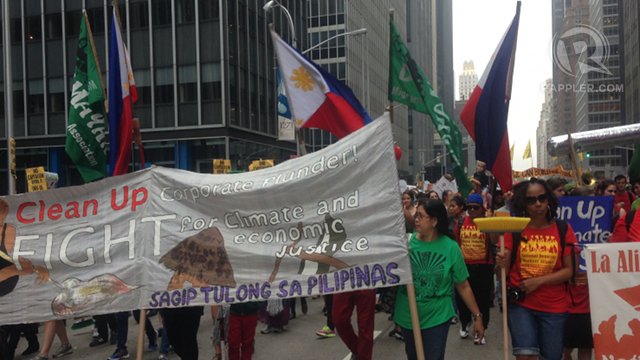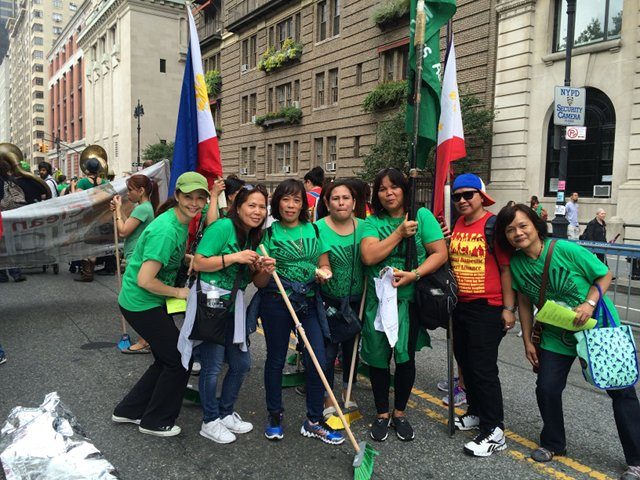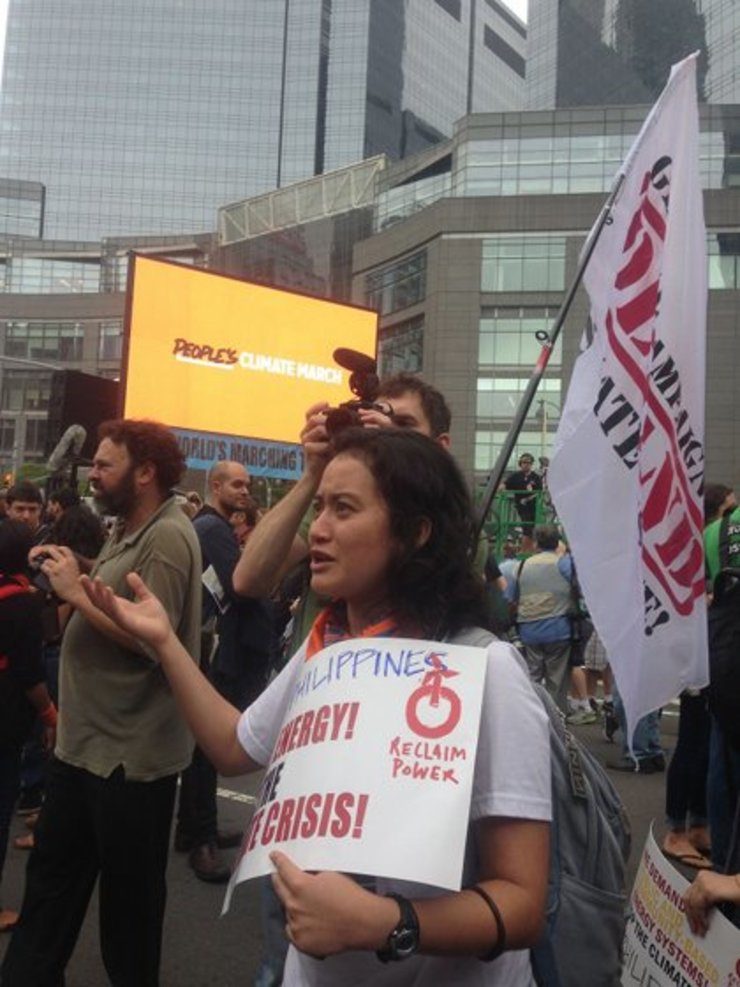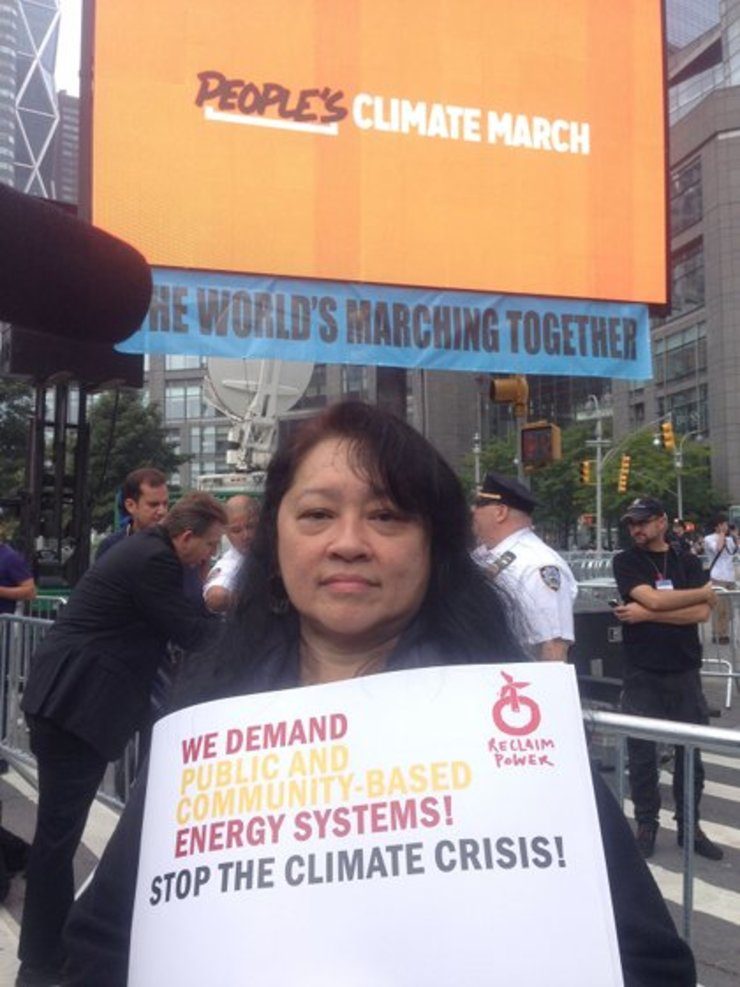SUMMARY
This is AI generated summarization, which may have errors. For context, always refer to the full article.

NEW YORK, United States – Rosalina Cionelo, 70, has been working as a domestic worker overseas for 20 years, saving up for her family’s future and looking forward to retirement in her hometown in Dulag, Leyte.
Yet in just one day, when Super Typhoon Yolanda (Haiyan) ravaged the Visayas on November 8, 2013, all her backbreaking work was gone. She is now among Filipino domestic workers here urging the Philippine and US governments to ensure that they get immigration relief to continue working and sending remittances to their families.
Cionelo and her New York and New Jersey-based domestic workers’ group called Damayan joined the People’s Climate March here on Sunday, September 21, to highlight how climate change affects Filipino migration and poverty. The march was touted as the largest climate rally in history, with 310,000 people participating.
Climate change is a key issue for the Philippines, which is the third most disaster-prone country in the world according to the World Disaster Report 2012.
“My house until now has no roof,” Cionelo told Rappler on the sidelines of the march. “Everything was gone. The interior is all ruined. My brother’s livelihood, he used to have a piggery, now it’s all washed out. I have 3 hectares of coconut plantation and mahogany trees, no more. Now, I have to start from scratch. That’s why I would like to request from the US government to grant us this [temporary protection status] so I can work with no fear.”
The Philippine government requested the US for a temporary protected status (TPS) for Filipino workers back in December 2013. With a TPS, the US may allow workers from a country that experienced an environmental disaster or armed conflict to continue working without being detained on the basis of immigration status.
Yet, until now, the US government has yet to grant the request. Damayan Coordinator Linda Oalican blamed this on the “lukewarm support” of the Philippine government. He called on President Benigno Aquino III to raise the issue while he visits the US this week.
“President Aquino, we really need temporary protected status. Please remember that we, the overseas Filipino workers, are really supporting the economy of the country ….. Many of our workers are aging mothers. You know how hard it is to work without work authorization? It’s very hard, President Aquino. We don’t deserve that,” said Oalican, also a domestic worker for 20 years.
Oalican stressed the connection between the climate crisis and economic crisis, where the effects of extreme weather events like Yolanda undermine economic growth. She said this forces many Filipinos, especially mothers, to become domestic workers abroad and become vulnerable to labor trafficking.
“Many of us are college-educated. We have professions back home, all of us have families. All of us send remittances, the largest source of revenue for the government of the Philippines but what’s happening to us? We are the so-called modern heroes for the Philippines. All we want to do is work to support our families and we need immigration protection to be able to work legally,” said Oalican, a former community development specialist in the Philippines.
Carrying Philippine flags, brooms and a giant mop to symbolize their plight, Oalican, Cionelo and members of Damayan walked the streets of Manhattan to push for their advocacy, and to call on their government and other world leaders to act on climate change.

‘Aquino climate policies inconsistent’
Filipino climate activists also flew in from Manila to take part in the historic march. They, too, have an appeal to Aquino as he addresses his fellow heads of state at the UN Climate Summit on Tuesday, September 23. (READ: Q and A: What’s at stake for PH in climate summit)
Lidy Nacpil of the Philippine Movement for Climate Justice is a Philippine Global Ambassador of the march’s organizing team. She told Rappler that Aquino has made strides in fighting climate change at home but his record is “inconsistent.”
“The Philippines is one of the governments that have done good things. They created the Climate Change Commission but this will be undermined by other things they are doing like expanding the dirty energy industry in the Philippines. They have more than 40 coal plants in the pipeline,” said Nacpil.
“So the challenge to President Aquino is to be consistent, if you want the Philippines to be seen as genuinely solving the climate crisis, then you also have to change your energy policies and economic policies because this is also about the economy.”
The environmental group Greenpeace also criticized Aquino’s support for coal, saying it is “a highly polluting energy source and emits much more carbon per unit of energy than oil and natural gas.” The group said in a statement that 34% of the Philippines’ power generation comes from coal.

Nacpil’s colleague, Kathryn Leuch, was passionate about the issue as she talked to journalists from different countries before the start of the march.
Leuch said being a developing country does not give the Philippines “license to pollute.” She reacted strongly to Aquino’s plan to call for action from top greenhouse gas emitters during the UN summit.
“PNoy, please naman, you cannot demand them to cut their emissions when right in your backyard, 45 coal plant boilers, expansion and new coal-fired power plants ipapatayo mo? Ano ‘yun? Katawa-tawa. At the same time, sasabihin mo kailangan natin mag-adapt to climate change, hihingi ka sa kanila ng support pero ikaw mismo ‘di mo maayos ang sistema sa sarili mong bansa,” Leuch told Rappler.
(PNoy, please, you cannot demand them to cut their emissions when right in your backyard, you will build 45 coal plant boilers. What’s that? That’s ridiculous. At the same time, you say we need to adapt to climate change, you ask them for support but you cannot even fix the system in your own country.)
Leuch added that the Philippines must invest more in renewable energy while “stopping” extractive industries like mining. “Tampakan Mines [in Mindanao] is a disaster waiting to happen. It will affect watersheds, water for agricultural lands and displace people so there’s so much at stake.”
Philippine Climate Change Commissioner Naderev “Yeb” Saño told Rappler in a previous interview that investing in renewable energy will be easier if developed nations fulfill their responsibility to give financial support to developing nations, what is known as climate finance.

‘Accumulating political power’
Nacpil said she and Leuch joined the People’s Climate March to support the global movement of grassroots organizations and ordinary people to pressure world leaders, who they criticize for inaction on climate change.
“We’re here mainly for the mobilization. We believe it’s a very important part of the process of building movements globally, the movements inside the different countries so one day, we can accumulate the political power to be strong enough to compel governments,” Nacpil said.
Leuch agreed. “This is [more] important compared to the UN Climate Summit because this is where the ordinary people are. People who are actually out there, having to deal with the impacts of the warming climate.”
As world leaders arrive here for the UN summit and discuss the complexity of emissions, technology and economics, to domestic workers like Cionelo, the significance of climate change is simple.
“Climate change is important for us domestic workers. When the weather is bad, it’s hard for us to come to work. How can we earn? And our job is cleaning up the mess,” she said. – Rappler.com
Rappler multimedia reporter Ayee Macaraig is a 2014 fellow of the Dag Hammarskjöld Fund for Journalists. She is in New York to cover the UN General Assembly, foreign policy, diplomacy, and world events.
Add a comment
How does this make you feel?
There are no comments yet. Add your comment to start the conversation.